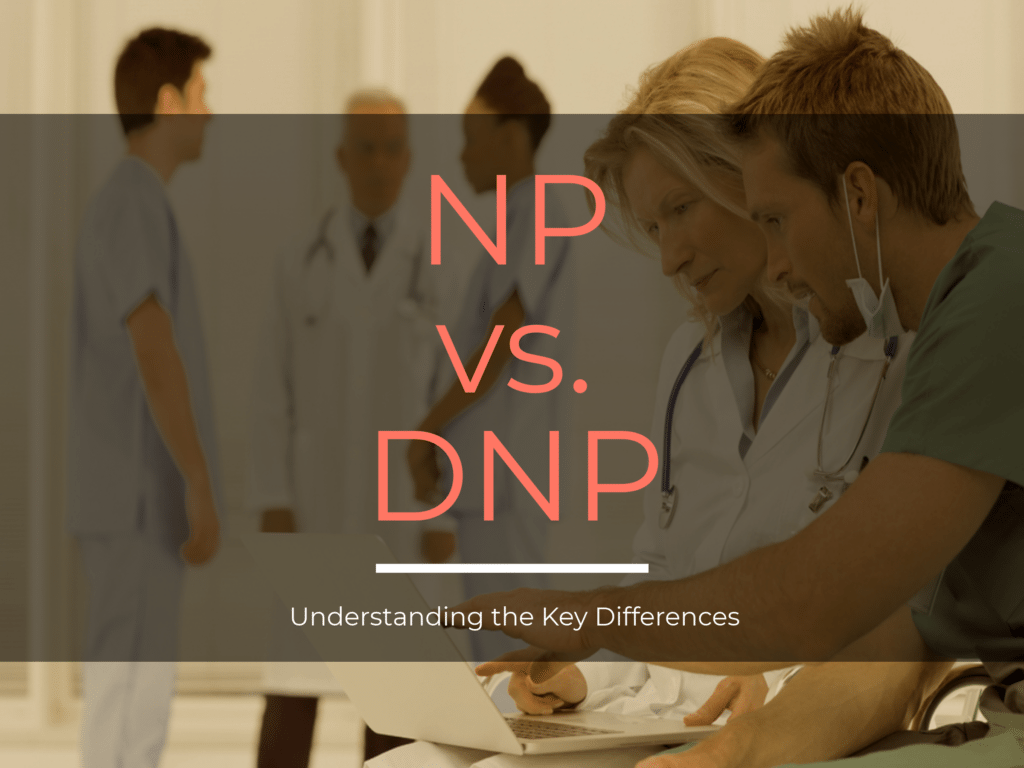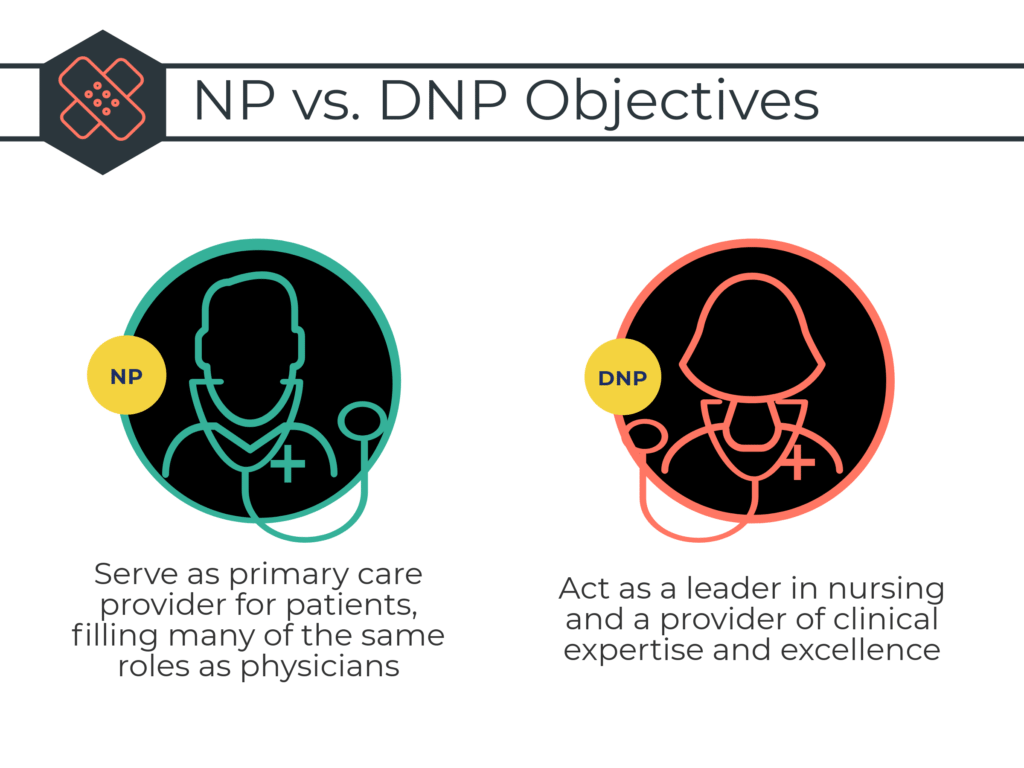The NP vs DNP salary comparison guide compares the Nurse Practitioner (NP) and Doctor of Nursing Practice (DNP) career paths for nurses.
Breakdown of NP vs DNP
Navigating the world of nursing can be overwhelming with all the acronyms and abbreviations thrown around. One of the most confusing distinctions is between NP (Nurse Practitioner) and DNP (Doctor of Nursing Practice) and how it affects salary. While both an NP and DNP require expertise, it is important to understand the difference between the two. The main difference is a DNP is a terminal degree in the field of nursing and an NP is a nursing occupation.
| Job | Degree |
|---|---|
| Nurse Practitioner (NP) | DNP or Doctor of Nursing Practice |

What is a Nurse Practitioner (NP)?
A Nurse Practitioner (NP) is a highly trained healthcare professional who provides a wide range of primary and specialty healthcare services to patients. They are considered advanced practice registered nurses (APRNs) and have the authority to diagnose and treat illnesses, order and interpret tests, prescribe medications, manage chronic diseases, provide counseling and education, and promote health and wellness. Depending on the state, NPs may be authorized to practice independently or collaborate with a physician.
It’s important to note that becoming an NP requires passing a certification exam, which can be done after earning a master’s degree (MSN) or doctoral degree (DNP, PhD). NPs may also specialize in various areas of healthcare, such as Adult-Gerontology, Emergency Care, Family Health, Pediatrics, Women’s Health, and more. On the other hand, a Master of Science in Nursing (MSN) is an advanced degree that prepares nurses for leadership roles in healthcare, such as nurse educator, nurse administrator, or APRN roles.
What is a Doctor of Nursing Practice (DNP)?
Doctor of Nursing Practice (DNP) is a degree. However, DNP does not imply any particular career path or job. Someone with a DNP does not work as a doctor. Rather, they work as a nursing educator, a nursing manager, an administrator, or, possibly, high-level NP if they’re certified.
Nurse Practitioner is only one of the possible career paths for someone with a DNP degree. The DNP is a professional degree rather than an academic degree. Its main counterpart, a PhD, is primarily for professors and researchers. DNP programs focus on putting research and knowledge into practice in nursing management, education, administration, and consulting roles.
Doctoral degrees are also terminal degrees. This means they are the highest degree one can achieve in a given field.
- Doctor of Nursing Science (DNS)
- Doctor of Philosophy (PhD)
- Doctor of Education
While an NP will work in a medical facility like a hospital or clinic, these professionals with a DNP degree work in all sorts of environments. They range from healthcare settings to universities, research centers, nonprofits, government, and industry, depending on what kind of career they enter. Quite simply, a DNP degree opens up a lot more doors for an NP than just an MSN.
Is a DNP a Doctor?
Is a DNP a doctor? Well, that depends on what you mean by “doctor.” When you see MD at the end of a doctor’s name, that signifies that that person both has a medical doctorate degree and is a Medical Doctor (or physician). That is, MD is both a degree (Doctor of Medicine) and a title (Medical Doctor). It says what degree they have, and what job they do. “DNP” at the end of a nurse’s name, however, simply means that that person has a Doctor of Nursing Practice degree. It doesn’t tell you anything about what job they do, because DNP holders can have many kinds of jobs.
MSN vs DNP Degrees Compared
As an aspiring nurse practitioner, you’ll need to choose whether you want to attend an MSN program or a DNP program. Prospective nursing students should research the cost and benefits of each path.
| Criteria | MSN Degree | DNP Degree |
|---|---|---|
| Programs | ADN-to-MSN: 3-5 years BSN-to-MSN: 2 years | ADN-to-DNP: 5-6 years BSN-to-DNP: 3-4 years MSN-to-DNP: 2 years |
| Coursework | Clinical practice, direct patient care and advocacy, and 500 clinical hours. | Nursing leadership, evidence and research based practice, and 1000 clinical hours. |
| Salary | $101,000 (Payscale) | $110,000 (Payscale) |
| Employment | Primary Care Provider role | Management, Leadership, Policy Administration, and Faculty roles |
| Work | Hospitals Physicians Offices Educational Services Office of Other Health Practitioners Long-Term Care Facilities Community Clinics | Management Leadership Policy Administration Faculty roles |
Nursing Jobs with an MSN
Many advanced roles in nursing require a minimum of a master’s degree. Below are some popular job opportunities for nurses with a master’s degree.
Family Nurse Practitioner
Nurse Practitioners have become central to the American healthcare system, especially Family Nurse Practitioners. This is because NPs are able to practice completely independently in many states and because there is a shortage of medical doctors all over the US, especially in rural and low-income areas.
Salary: $100,503 (Payscale)
Psychiatric Mental Health NP
A Psychiatric Mental Health NP specializes in the diagnosis and treatment of mental health disorders. They provide comprehensive mental health care to patients, including assessment, diagnosis, treatment, and follow-up. A PMHNP must have a master’s degree in nursing and must be licensed to practice in the state in which they work.
Salary: $115,723 (Payscale)
Nursing Jobs with a DNP
DNP graduates typically earn a higher salary and have more leadership roles and responsibilities. Below are some common jobs for nurses with a DNP.
Chief Nursing Officer (CNO)
These nursing professionals treat patients with psychiatric disorders, such as anxiety, substance abuse, depression, and schizophrenia.
Nursing Director
A Nursing Director manages a nursing team or staff and is in charge of its daily operations. They are typically in charge of staffing, compliance, supplies, and also continuing education for the team.
Nurse Anesthetist
A nurse anesthetist is a specialized nurse who administers anesthesia to patients undergoing surgical, diagnostic, or therapeutic procedures. They typically work in hospitals, ambulatory care centers, and outpatient centers.

What are the Requirements to Become an NP?
To become a Nurse Practitioner, you have to at least have a Master of Science in Nursing degree to earn all of the credit hours and clinical hours necessary to sit for a Nurse Practitioner certification exam. Many colleges and universities now offer specialized courses of study for students who want to become Nurse Practitioners. These programs are tailored to the requirements of the main certification exams, so graduates can be sure they will qualify. There are a number of different NP specializations and certifications. Some of the nursing specializations include:
- Family Nurse Practitioner (more)
- Adult-Gerontology Primary or Acute Care (more)
- Pediatric Primary or Acute Care
- Psychiatric Mental Health
- Neonatal
- Women’s Health/Nurse Midwifery
- Certified Nurse Anesthetists
Certification for Nurse Practitioners
The main certification for Nurse Practitioners comes from the American Nurses Credentialing Center (ANCC), which covers most of these specializations, but there are several other recognized national certifications:
- American Academy of Nurse Practitioners Certification Program (AANPCP)
- American Association of Critical-Care Nurses (AACN)
- National Certification Corporation (NCC)
- Pediatric Nursing Certification Board (PNCB)
To work as a Nurse Practitioner, you must pass one of these certification exams, and to even get the chance to take the exam, you have to have at least an MSN degree. Many nursing schools are developing online RN to BSN and RN to MSN degree programs to help working nurses get their higher degrees more conveniently. However, a DNP degree also includes all of the qualifications necessary for the exam, so accelerated programs that will take students all the way from a BSN to a DNP are becoming far more common than they used to be.
NP vs DNP Objectives
- NPs serve as primary care providers for patients, filling many of the same roles as physicians.
- DNPs are leaders in nursing and providers of clinical expertise and excellence.

How Much Does a DNP Make vs an NP?
Generally speaking, all advanced practice nurses earn more than RNs. Additionally, an NP with a DNP can expect to make more than an NP with an MSN because the DNP degree can qualify nurses for higher leadership positions. DNP vs NP salary is complicated. It’s not quite apples and oranges, but there are a lot of varieties of apples.
National Average Salary for Nurses
Let’s break it down. According to Payscale, the national average Nurse Practitioner salary is $124,886. However, that’s all jobs averaged together, regardless of degree or years of experience. And experience can make a big difference in pay. NPs in their late career, with many years of experience, make 10% more than the average, while entry-level NPs make 5% lower than the average.
The BLS reports the median annual salary for NPs is $124,680 per year (BLS). And salaries for these advanced practice registered nurses range from $87,340 to $165,240.
| Nurse Type | National Salary |
|---|---|
| Registered Nurses (RNs) | $89,010 per year (BLS) |
| Nurse Midwives | $122,450 per year (BLS) |
| Nurse Practitioners | $124,680 per year (BLS) |
| Nurse Anesthetists | $205,770 per year (BLS) |
| Nurse Educators | $84,180 per year (BLS) |

DNP Salary by Nursing Specialty
The picture of a DNP vs NP salary gets a little clearer when we search specifically for the degree. Professionals with a DNP can take on lots of different jobs, after all. If we narrow it down to Nurse Practitioners, we see where the distinction comes in.
By Payscale data, Adult-Gerontology Nurse Practitioners who have a DNP degree make an average of $113,000. That’s well above the $95,000 average for NPs. That would imply, of course, that the lower bound of NP salary, the entry-level, is primarily made up of NPs with an MSN degree. The combination of a higher degree and (usually) more experience (most DNP programs require at least 5 to 10 years of work experience for applicants) means that NPs with a DNP degree are going to make a lot more.
Furthermore, having a DNP degree skews DNP vs NP salary data in the favor of DNP, even more, when you consider the fact that the DNP qualifies professionals for many more career paths than Nurse Practitioners. For instance, in Payscale, Nursing Managers with a doctorate earn an average of $112,000, while DNP-holding Clinical Directors can make as much as $165,000. On the other hand, an Assistant Professor in Nursing might only expect around $81,000.
| Job Title with DNP | Salary |
|---|---|
| Chief Nursing Officers (CNOs) | $138,633 (Payscale) |
| Director of Nursing | $95,730 (Payscale) |
| Clinical Nurse Specialists (CNSs) | $96,734 (Payscale) |
| Nurse Researchers | $81,500 (Payscale) |
| Clinical Directors | $82,645 (Payscale) |
| Nursing Managers | $92,119 (Payscale) |

Job Outlook and Growth for Nurses With DNPs
The is an increase in demand for Nurse Practitioners, especially in some of the very understaffed areas like nurse anesthetists and nurse midwives. And the Bureau of Labor Statistics (BLS) expects the job market for advanced nursing professionals to grow by as much as 40% over the next decade. That’s way higher than the national average for all occupations combined.
| Nurse Type | Job Growth |
|---|---|
| Registered Nurses (RNs) | 6% (BLS) |
| Nurse Midwives | 7% (BLS) |
| Nurse Practitioners | 46% (BLS) |
| Nurse Anesthetists | 12% (BLS) |
And as the field grows, competition is going to get even more fierce for advanced nursing roles. Most working nurses are still going to choose the conventional MSN route to an NP certification. However, those who go on to earn a DNP will set themselves apart in the advanced practice nursing job market and increase their earning potential.
Should You Choose a Masters’s Degree or Doctorate Degree to Become an NP?
Advanced education and training typically earn nurses a higher salary due to the increased level of education and expertise. However, it’s important to note that salary can also vary based on the job location, prior experience, and specialty.
The decision to pursue a master’s degree or doctorate degree to become an NP will depend on your career goals and the type of NP you wish to be. If you plan to work in a clinical setting, a master’s degree is usually the minimum requirement, but if you want to pursue a leadership role or specialize in a certain area, a doctorate degree may be the better option.
Ultimately, the type of role you want to pursue will determine which degree is best for you. So, as you navigate your nursing career, don’t be afraid to ask questions and seek guidance to help you make informed decisions.
Related:






